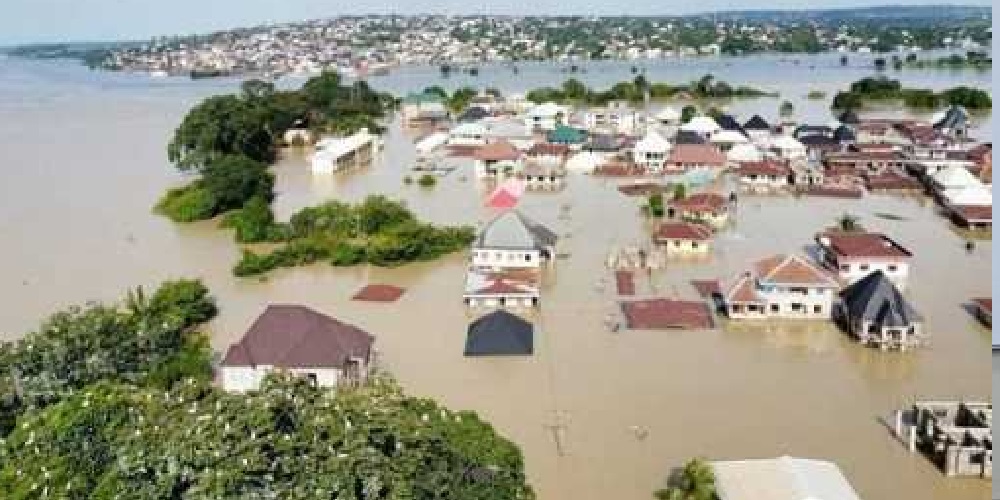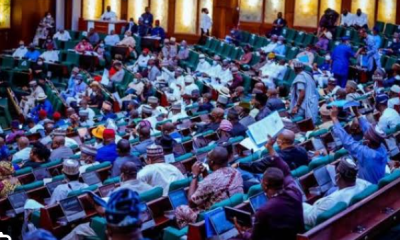News
Fresh fears of food crisis as floods sweep states, submerge farmlands

Severe flooding across the states has continued to ravage farmland and submerge buildings with farmers saying the signs are ominous for food production.
The National Emergency Management Agency (NEMA) confirmed last week that the flooding has already claimed 185 lives and displaced 208,000 people in 28 states across the country.
About 107,000 hectares of farmland have been washed away, much of it in the north.
Hundreds of private and public buildings and infrastructure were submerged.
Reports from different parts of the country yesterday showed that floods resulting from persistent rainfall in Yobe,Niger,Zamfara,Gombe and Benue States,among others ,in the last few days have submerged more farmlands ,roads , and properties both private and public.
Taraba State, which is often flooded at this time of the year when Cameroun’s Lagdo Dam is opened to release its excess water,has put in place a flood control team across all its 168 wards.
The various state emergency management agencies and NEMA are also mobilising human and material resources to deal with the situation.
Most hit by the floods in Niger State are Mashegu and Magama local government areas where thousands of farmlands planted with rice, maize, yam, sorghum and millet have been devastated.
Farmers in the areas now lament that they have practically nothing to harvest later in the year.
Usman Danjuma, an Agricultural Economist in Minna, said the flooding could worsen the current cost of living as the prices of food might go up.
Farmers in Logo, Guma, Gwer-West,Agatu,Kwande, Makurdi ,Ado, Okpokwu, Otukpo,Buruku and Katsina Ala local government areas of Benue State have also suffered huge losses caused by the flooding.
The affected farms are located along the banks of the Benue River which usually overflows its banks at this time of the year.
The State Emergency Management Agency ( SEMA) has embarked on an awareness campaign to educate farmers on the prediction by the Nigerian Meteorological Agency (NiMet) of more rains this year.
Professor of Agronomy at J.S Tarka University, Makurdi, Daniel Agenda, called for the dredging of River Benue to enable it to absorb more flood water, saying this would go a long way in saving farms along the banks of the river from incessant flooding.
Over 3,000 displaced from Kaduna agrarian communities
Executive Secretary of the Kaduna State Emergency Management Agency, Dr. Usman Hayatu-Mazadu, said in Kaduna that 3,633 people have been displaced by floods in five agrarian communities in Zango Kataf Local Government Area.
The North-West Zonal Coordinator of NEMA Imam Garki said the recent flooding in Fadan Tsoho, Zonzon, Zangon Kataf, Unguwan Wakili, and Zonkwa communities swept away farmlands and livestock.
An Agricultural Economist in the state , Mr Benjamin Kemje, asked government to assist farmers to recoup their losses, otherwise, they would increase food prices to make up for their losses.
Jigawa and Zamfara states have also been badly hit by the flooding.
Incidentally, many of the northern states are considered Nigeria’s food basket.
Last Friday’s rainfall in Zamfara seems to have only added to an already bad situation.
Like the earlier ones, the last rain left many parts of the state submerged and the residents helpless.
Many houses in Samaru area of Gusau and Gengerin Maigemu were taken over by flood.
Flood destroyed 1,650 houses in 2 towns in Yobe, says SEMA
Floods triggered by days of torrential rain, destroyed 1,650 houses in Jajere and Yunusari towns of Yobe,according to the Executive Secretary of the State Emergency Management Agency (SEMA), Dr Mohammed Goje.
Goje told the News Agency of Nigeria (NAN) in Damaturu that a total of 413 households in the areas were displaced by the latest flash flood.
Goje said that a final assessment on the destruction caused by yet another flood in Yusufari, Wagir, Mutai Chirokusko, Bade and Potiskum towns was ongoing.
“ SEMA is conducting daily review meetings to assess the situation, update stakeholders and come up with immediate response plan in line with vulnerabilities of affected locations and resources available on ground,” he said.
Flood destroys 2517 houses,1000 hectares of farmland in Gombe – SEMA
The flood was equally devastating in Gombe State where the SEMA said 2,517 houses and shops were either completely or partially destroyed in 33 communities.
The Deputy Director, Relief and Rehabilitation of the agency, Mr Ibrahim Nalado, named the affected communities as Dukku, Funakaye and Billiri Local Government Areas (LGA) of the state.
On the impact of flooding on farmlands, the deputy director said Hina community in Yamaltu/Deba LGA of the state was the worst-hit.
He said that no less than 1,000 hectares of rice, maize, sorghum and millet farmlands were submerged in water.
The deputy director stated that his team visited Hina community on Friday, Aug. 30, to assess the level of damage.
Nalado described the impact of the flooding as ‘huge and devastating’ in view of the vast area affected.
“Farmers were getting ready to harvest their crops.
“The farmers were so worried but because it was a natural phenomenon, they accepted it in good faith,” he said.
The deputy director stated that data on the number of farmers affected by the flood were being collated at Hina.
Nalado stated that his agency had assessed the level of damage, but were compiling the reports to forward to the state government and other relevant agencies.
He, however, said that the level of damage on farmlands at Hina, would take collective efforts of both the state and the Federal Government to address.
News
Just in: NNPC Cuts Petrol Price Amid Competitive Moves with Dangote Refinery

By Kayode Sanni-Arewa
The Nigerian National Petroleum Company (NNPC) Limited has announced a reduction in the pump price of Premium Motor Spirit (PMS), popularly known as petrol, at its retail outlets in the Federal Capital Territory (FCT), Abuja.
According to a report by The Cable, the petrol price at the NNPC station in Wuse Zone 3, Abuja, was cut from ₦935 per litre to ₦910, signaling a slight relief for consumers in the nation’s capital.
However, the new pricing has not yet extended to Lagos, where petrol prices at NNPC retail outlets remain unchanged. This discrepancy has sparked renewed concerns over regional price variations in Nigeria’s downstream oil market.
The latest adjustment comes in the wake of an intensifying price contest between NNPC and the privately-owned Dangote Refinery. Just days earlier, on May 12, the Dangote Refinery lowered its ex-depot petrol price to ₦825 per litre, a strategic move aimed at capturing a larger share of the domestic fuel market.
The price reduction appears to be an outcome of recent high-level discussions between NNPC’s Group Chief Executive Officer (GCEO), Bayo Ojulari, and Dangote Refinery’s founder, Aliko Dangote. The meeting, held on May 9, reportedly sought to realign the relationship between the two entities and promote collaboration rather than rivalry.
Speaking after the meeting, Dangote stated, “There is no competition between us; we are not here to compete with NNPC Ltd. NNPC is part and parcel of our business, and we are also part of NNPC. This is an era of cooperation between the two organisations.”
Ojulari echoed this position during a press briefing on May 12, attributing the petrol price reduction to the recent procurement of fuel at lower international prices. He explained that the earlier surge in pump prices was due to existing stock purchased by marketers at higher rates.
“This downward price adjustment reflects our effort to respond to changing supply conditions and deliver better value to Nigerians,” Ojulari said, while also noting that more adjustments may occur as the market stabilizes.
Industry observers view the ongoing price adjustments as an early indicator of growing competition in Nigeria’s petroleum sector, especially with the Dangote Refinery ramping up its operations. Analysts believe that sustained collaboration between both players could enhance supply efficiency and potentially ease the burden of fuel costs for consumers nationwide.
News
BUNKERING: Army, Tantita Security Arrest Truck Laden with Illegally Extracted Crude Oil in Delta

A joint team comprising officers of the 181 Battalion, Nigerian Army, Oleh, and personnel from Tantita Security Services Nigeria Ltd. has arrested a vacuum truck involved in illegal crude oil extraction at Well 3, Olomoro, in Isoko South Local Government Area of Delta State.
According to reports, the truck, which previously belonged to Engr. Daniel Omoyibo, also known as Damotech, was gifted to the driver, Mr. Matthew Ojomikre, who is currently being detained at the Forward Operating Base (FOB), 181 Battalion, Oleh.
Upon interrogation, the driver confessed that his company had been contracted by Heritage Energy Operational Services Ltd. to evacuate sludge from Well 3, Olomoro. However, he was unable to provide any formal approvals or documentation authorizing the activity, as was previously the norm.
Until recently, Heritage Energy Operational Services Ltd. had consistently provided crude and condensate trucking permits to officers of the Nigerian Army and Tantita Security Services Nigeria Ltd. for proper monitoring from the loading point to the discharge location.
Officers of Tantita Security Services, in collaboration with a team from Heritage and the Nigerian Army, have collected samples from the vacuum truck for laboratory testing and analysis.
The preliminary confessional statement from the driver indicates that he illegally collected crude oil from Well 3 under the pretense of evacuating sludge from the wellheads.
Authorities have reported that the same truck has previously been involved in unauthorized crude oil evacuations within the Isoko axis.
The driver, the truck, and its contents remain in custody at the 181 Battalion Base in Oleh for further interrogation and possible prosecution.

News
AMMC Partners NUJ-FCT On Infrastructural Development

-

 News19 hours ago
News19 hours agoJust in: Another major headache as 3 PDP senators defect to APC
-

 News20 hours ago
News20 hours agoCourt Jails Two Six Months for Naira Abuse in Lagos
-

 News21 hours ago
News21 hours agoUnion seals Lagos company over racial discrimination of workers
-

 News20 hours ago
News20 hours ago$1.43m scam: Ajudua on the run as Supreme Court orders his return to prison
-

 News21 hours ago
News21 hours agoCBN warns public against fraudsters claiming to act on its behalf
-

 News18 hours ago
News18 hours ago10 WAEC students still missing as Rivers women demand Sole Administrator’s intervention
-

 News5 hours ago
News5 hours ago19-Year-Old Candidate Commits Suicide over Low UTME Score
-

 News18 hours ago
News18 hours agoReps reject bill on rotational presidency among six geopolitical zones









